We shall overcome,
We shall overcome, some day.
Oh, deep in my heart, I do believe
We shall overcome some day.
We shall live in peace,
We shall live in peace,
We shall live in peace some day.
Oh, deep in my heart, I do believe
we shall overcome some day.
We'll walk hand in hand
We'll walk hand in hand
We'll walk hand in hand some day.
Oh, deep in my heart, I do believe
we shall overcome some day.
Black and white together,
Black and white together.
Black and white together some day.
Oh, deep in my heart, I do believe
We shall overcome some day.
We are not afraid,
We are not afraid,
We are not afraid today!
Oh, deep in my heart, I do believe
We shall overcome some day.
The whole wide world around
The whole wide world around
The whole wide world around some day.
Oh, deep in my heart, I do believe
We shall overcome some day.
inviata da Riccardo Venturi
A different version of the song, not the same as the version used (and, probably, reshaped) by Martin Luther King's Civil Rights Movement:
We shall overcome
We shall overcome
We shall overcome some day
Oh deep in my heart
I do believe
We shall overcome some day
We'll walk hand in hand
We'll walk hand in hand
We'll walk hand in hand some day
Oh deep in my heart
I do believe
We shall overcome some day
We shall all be free
We shall all be free
We shall all be free some day
Oh deep in my heart
I do believe
We shall overcome some day
We are not afraid
We are not afraid
We are not afraid today
Oh deep in my heart
I do believe
We shall overcome some day
We are not alone
We are not alone
We are not alone today
Oh deep in my heart
I do believe
We shall overcome some day
The whole wide world around
The whole wide world around
The whole wide world around some day
Oh deep in my heart
I do believe
We shall overcome some day
We shall overcome
We shall overcome
We shall overcome some day
Oh deep in my heart
I do believe
We shall overcome some day
inviata da Riccardo Venturi
Artisti vari, da: Where Have All The Flowers Gone - The Songs of Pete Seeger.
We shall overcome, we shall overcome
We shall overcome someday
Oh deep in my heart, I do believe
That we shall overcome someday
We'll walk hand in hand, we'll walk hand in hand
We'll walk hand in hand someday
Oh deep in my heart, I do believe
That we shall overcome someday
We shall live in peace, we shall live in peace
We shall live in peace someday
Oh deep in my heart, I do believe
That we shall overcome someday
We shall brothers be, we shall brothers be
We shall brothers be someday
Oh deep in my heart,I do believe
That we shall overcome someday
The truth shall make us free, the truth shall make us free
The truth shall make us free someday
Oh deep in my heart, I do believe
That we shall overcome someday
We are not afraid, we are not afraid
We are not afraid today
Oh deep in my heart, I do believe
That we shall overcome someday
inviata da Eva Sgro - 9/1/2005 - 15:19
Roger Waters' message:
Roger Waters
We shall overcome
We shall overcome
We shall overcome some day
Deep in my heart
I do believe
That we shall overcome
Some day
And we'll walk hand in hand
we'll walk hand in hand
we'll walk hand in hand one day
Deep in my heart
I do believe
That we'll walk hand in hand
One day
And we'll break down the prison walls
We will tear down those prison walls
Together we will tear down the prison walls on that day
Deep in my heart
I do believe
That we will tear down all those prison walls
On that day
Deep in my heart
I do believe
That we will tear down those prison walls
On that day
And the truth will set us free
The truth will set us free
The truth will set us all free
On that day
And deep in my heart
I do believe
That the truth will set us all free
And we shall overcome
On that day
inviata da giorgio - 10/3/2011 - 08:32
Tony Cucchiara
Album / Albumi: Folk Theme [1969]
We shall overcome
We shall overcome
Noi ci riusciremo un giorno
A parlare tra noi
In un mondo che
Non ha più frontiere
We shall overcome
We shall overcome
Noi ci riusciremo insieme
Ci sarà libertà
Nella verità
Ci sarà l'amore
We shall overcome
We shall overcome
Non abbiamo più paura
Nel profondo del cuore
Vedo che oramai
Noi ci riusciremo
inviata da Alberto Scotti - 16/11/2022 - 01:37
Noi ce la faremo noi ce la faremo
Noi ce la faremo un dì
Oh oh oh dentro di me io sento che
Noi ce la faremo un dì
Mano nella mano mano nella mano
Mano nella mano noi
Oh oh oh dentro di me io sento che
Noi ce la faremo un dì
Niente più paura niente più paura
Niente più paura mai
Oh oh oh dentro di me io sento che
Noi ce la faremo un dì
Noi vivremo in pace noi vivremo in pace
Noi vivremo in pace sì
Oh oh oh dentro di me io sento che
Noi ce la faremo un dì
Libertà per tutti libertà per tutti
Libertà per tutti noi
Oh oh oh dentro di me io sento che
Noi ce la faremo un dì
Noi ce la faremo noi ce la faremo
Noi ce la faremo un dì
Oh oh oh dentro di me io sento che
Noi ce la faremo un dì
inviata da Gianni Barnini - 16/1/2021 - 12:47
Noi trionferemo,
noi trionferemo,
noi trionferemo un giorno.
Oh, in fondo al cuore ci credo,
noi trionferemo un giorno.
Noi vivremo in pace,
noi vivremo in pace,
noi vivremo in pace un giorno.
Oh, in fondo al cuore ci credo,
noi trionferemo un giorno.
Noi cammineremo mano nella mano,
noi cammineremo mano nella mano,
noi cammineremo mano nella mano un giorno.
Oh, in fondo al cuore ci credo,
noi trionferemo un giorno.
Neri e bianchi insieme,
neri e bianchi insieme,
neri e bianchi insieme un giorno.
Oh, in fondo al cuore ci credo,
noi trionferemo un giorno.
Italian "Translasong" by Andrea Buriani
"Traduchanson" italienne : Andrea Buriani
Andrea Burianin italiankielinen "käännoksenlaulu"
Noi ci riusciremo un dì, noi ci riusciremo un dì, noi ci riusciremo un dì
So che in fondo al cuor la certezzza c’è, noi ci riusciremo un dì
Pace allor sarà, Pace allor sarà, Pace costruiremo un dì
So che in fondo al cuor la certezzza c’è, noi ci riusciremo un dì
Mano nella mano allor, mano nella mano allor, noi cammineremo un dì
So che in fondo al cuor la certezzza c’è, noi ci riusciremo un dì
Neri e bianchi insieme, neri e bianchi insieme, noi cammineremo un dì
So che in fondo al cuor la certezzza c’è, noi ci riusciremo un dì
Non avrem paura, Non avrem paura, non avrem paura mai
So che in fondo al cuor la certezzza c’è, noi ci riusciremo un dì
Non saremo soli, Non saremo soli, noi non saremo soli mai
So che in fondo al cuor la certezzza c’è, noi ci riusciremo un dì
Liberi saremo un dì,liberi saremo un dì, liberi saremo un dì
So che in fondo al cuor la certezzza c’è, noi ci riusciremo un dì
Tutto il mondo unito, tutto il mondo unito, Mai più guerra ci sarà
So che in fondo al cuor la certezzza c’è, noi ci riusciremo un dì
inviata da Andrea Buriani - 23/10/2011 - 16:03
Noi vinceremo,
noi conquisteremo i nostri ideali,
noi, un giorno non lontano, non potremo che trionfare.
Oh, nel profondo del mio cuore
io lo sento
che nostra, un giorno, sarà la vittoria!
Noi vivremo tutti in pace,
noi vogliamo vivere tutti in pace,
noi non possiamo vivere se non in pace.
Oh, nel profondo del mio cuore
io lo sento
che nostra, un giorno, sarà la vittoria!
Noi cammineremo mano nella mano,
noi avanzeremo aiutandoci l'un l'altro,
noi lotteremo sempre fianco a fianco per un mondo più giusto.
Oh, nel profondo del mio cuore
io lo sento
che nostra, un giorno, sarà la vittoria!
Neri e bianchi, insieme.
Persone di ogni colore, insieme.
Uomini e donne, tutti uniti per un mondo migliore.
Oh, nel profondo del mio cuore
io lo sento
che nostra, un giorno, sarà la vittoria!
Noi non abbiamo paura,
noi non dobbiamo avere paura,
noi, da oggi, non abbiamo più nulla di cui aver paura.
Oh, nel profondo del mio cuore
io lo sento
che nostra, un giorno, sarà la vittoria!
Tutto il mondo, nella sua vastità, sarà con noi,
tutta quanta la gente attorno sarà con noi,
l'intero vasto mondo, un giorno non lontano, sarà con noi.
Oh, nel profondo del mio cuore
io lo sento
che nostra, un giorno, sarà la vittoria!
inviata da Ferdinando Panzica - 9/5/2023 - 23:42
Bilingual (English and Italian) version by "The Phantom's", a beat band from the 60's/70's with Eligio Irato
we shall overcome,
we shall overcome some day.
Oh, deep in my heart, I do believe
we shall overcome some day.
Noi trionferemo,
noi trionferemo,
noi trionferemo un giorno.
Nel profondo del cuore io so, io credo
Che noi trionferemo.
La verità ci farà liberi
cammineremo tenendoci per mano,
Neri e bianchi insieme,
Noi trionferemo,
noi trionferemo,
noi trionferemo un giorno.
Nel profondo del cuore io so, io credo fermamente
Che un giorno noi trionferemo.
Black and White together,
black and white together.
black and white together some day.
Oh, deep in my heart, I do believe
we shall overcome some day.
inviata da Dq82 - 26/11/2016 - 11:52
9 dicembre 2006
Considero questa versione congiunta livornese e pisana uno dei maggiori contributi alla pace che abbia mai fornito a questo sito. La guerra tra Livorno e Pisa è, come è noto, uno dei conflitti più annosi che esistano sulla faccia della terra ; verso Tirrenia passa una demarcazione che non ha nulla da invidiare alla Shankill Road di Belfast o alla linea verde di Beirut. Ma perché Livorno e Pisa non fanno la pace una buona volta, unendosi magari per combattere un nemico comune come Lucca che ha dato i natali, tra le altre cose, a un testone di cazzo di neocon come Marcello Pera ?!? [RV]
Dai ‘é ci si fà
dai ‘é ci si fà,
dai ‘e un giorno ci si fà !
Me lo sento scoppià’,
pòssi schiantà’,
se un giorno ‘un ci si fà.
Senza stà’ a spaccà’
senza scianguinà’,
gào se un giorno ‘un ci si fà !
Me lo sento stioppà’,
pòssi stiantà’,
gào se un giorno ‘un ci si fà.
Mano nella mà’,
mano ‘ndella mà’,
dé, mì , un giorno ci s’anderà !
Me lo sento scoppià’,
pòssi schiantà’,
dé se un giorno ‘un ci si fà.
Livorno e Pisà, (*)
Livorno e Pisà,
‘nzieme a brucià Lucca si và !
Me lo sento stioppà’,
pòssi stiantà’,
dé se un giorno ‘un ci si và.
Anonimo Toscano del XXI Secolo, 22-1-2021 20:38
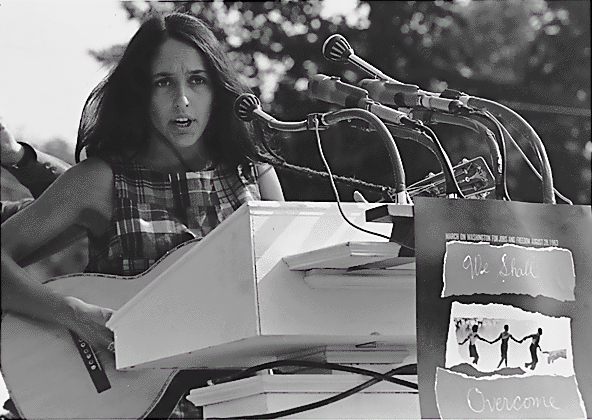
La version moderne de la chanson aurait été chantée pour la première fois par des ouvriers du tabac, dirigés par Lucille Simmons lors d'une grève en 1945 à Charleston, en Caroline du Sud. En 1947, la chanson fut publiée sous le titre We Will Overcome dans une édition du People's Songs Journal (une publication de People's Songs, une organisation dont Pete Seeger était le directeur), à titre de contribution et avec une introduction de Zilphia Horton, alors directrice musicale de la Highlander Folk School de Monteagle, au Tennessee (une école de formation des adultes qui a formé les délégués syndicaux). Horton a dit qu'elle avait appris la chanson de Simmons et qu'elle la considérait comme sa chanson préférée. Elle l'enseigna à beaucoup d'autres, y compris Pete Seeger, 2 qui l'incluait dans son répertoire, de même que de nombreux autres chanteurs activistes, tels que Frank Hamilton et Joe Glazer, qui l'avaient enregistré en 1950.
La chanson a été associée au mouvement des droits civiques à partir de 1959, lorsque Guy Carawan est intervenu avec sa version et celle de Seeger en tant que leader de la chanson à Highlander, qui était alors axée sur l'activisme non violent des droits civils. Il est rapidement devenu l'hymne non officiel du mouvement. Seeger et d'autres chanteurs célèbres du début des années 1960, tels que Joan Baez, ont chanté la chanson lors de rassemblements, de festivals folkloriques et de concerts dans le Nord et ont contribué à sa diffusion. Depuis qu'elle a pris de l'importance, la chanson et les chansons qui en découlent ont été utilisées dans diverses manifestations à travers le monde. - fr.wikipedia
Nous triompherons,
Nous triompherons,
Nous triompherons un jour!
Oui, au fond de mon cœur
J'en suis certain(e),
Nous triompherons un jour.
Nous vivrons en paix,
Nous vivrons en paix,
Nous vivrons en paix un jour!
Oui, au fond de mon cœur
J'en suis certain(e),
Nous triompherons un jour.
La main dans la main,
La main dans la main,
La main dans la main un jour!
Oui, au fond de mon cœur
J'en suis certain(e),
Nous triompherons un jour.
Noirs, blancs, tous ensemble,
Noirs, blancs, tous ensemble,
Noirs, blancs, tous ensemble un jour!
Oui, au fond de mon cœur
J'en suis certain(e),
Nous triompherons un jour.
Nous n'avons pas peur,
Nous n'avons pas peur,
Nous avons perdu la peur!
Oui, au fond de mon cœur
J'en suis certain(e),
Nous triompherons un jour.
Dans le monde entier,
Dans le monde entier,
Dans le monde entier, un jour!
Oui, au fond de mon cœur
J'en suis certain(e),
Nous triompherons un jour.
Heinz Erich Karallus
Wir werden's übersteh'n,
Wir werden's übersteh'n,
Wir werden's übersteh'n irgendwann.
Oh ho, in meinem Herzen tief,
Glaub ich fest daran,
Wir werden's übersteh'n irgendwann.
Wir gehen Hand in Hand,
Wir gehen Hand in Hand,
Wir gehen Hand in Hand irgendwann.
Oh ho, in meinem Herzen tief,
Glaub ich fest daran,
Wir gehen Hand in Hand irgendwann.
Wir sind alle gleich,
Wir sind alle gleich,
Wir sind alle gleich irgendwann.
Oh ho, in meinem Herzen tief,
Glaub ich fest daran,
Wir sind alle gleich irgendwann.
Wir sind alle frei,
Wir sind alle frei,
Wir sind alle frei irgendwann.
Oh ho, in meinem Herzen tief,
Glaub ich fest daran,
Wir sind alle frei irgendwann.
Wir haben keine Angst,
Wir haben keine Angst,
Wir haben keine Angst irgendwann.
Oh ho, in meinem Herzen tief,
Glaub ich fest daran,
Wir haben keine Angst irgendwann.
Wir sind nicht allein,
Wir sind nicht allein,
Wir sind nicht allein irgendwann.
Oh ho, in meinem Herzen tief,
Glaub ich fest daran,
Wir sind nicht allein irgendwann.
Wir werden's übersteh'n,
Wir werden's übersteh'n,
Wir werden's übersteh'n irgendwann.
Oh ho, in meinem Herzen tief,
Glaub ich fest daran,
Wir werden's übersteh'n irgendwann.
inviata da Dq82 - 26/11/2016 - 22:25
Another translation by a totally unknown translator.
Nosotros venceremos
Nosotros venceremos
Nosotros venceremos algún día
Oh, en mi corazón yo creo
Venceremos algún día
Caminaremos de la mano,
Caminaremos de la mano
Caminaremos de la mano algún día
En lo profundo de mi corazón, yo creo
Venceremos algún día
El mundo entero,
El mundo entero
El mundo entero un día
En lo profundo de mi corazón, yo creo
Venceremos algún día
No estamos asustados
No estamos asustados
No estamos asustados hoy...
En lo profundo de mi corazón, yo creo
Venceremos algún día
Guy Carawan, Pete Seeger –1960;
Spanish Lyrics: Members of El Teatro Campesino;
Music: Traditional, based on a mid-19th Century revival
hymn “I’ll Overcome”
ucds.edu
Nosotros venceremos, nosotros
venceremos Nosotros venceremos
ahora
O en mi corazón
Yo creo
Nosotros venceremos
No estamos solos
No estamos solos
No estamos solos ahora
O en mi corazón
Yo creo
Nosotros venceremos
No tenemos miedo
No tenemos miedo
No tenemos miedo ahora
O en mi corazón
Yo creo
Nosotros venceremos
inviata da dq82 - 27/11/2016 - 18:46
Adaptació de Joan Boix, en versió de Toni Giménez
Àlbum: Homenatge a Pete Seeger (CD 2) [2010]

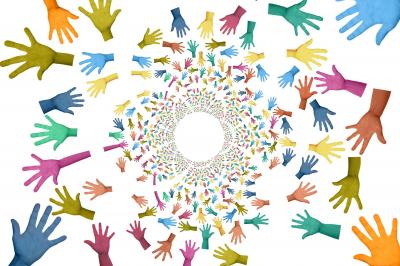
Tots junts vencerem,
tot junts vencerem,
tots junts vencerem demà.
Oh, dins del meu cor
crec fermament:
tots junts vencerem, demà.
Lliures hem de ser,
liures hem de ser,
liures hem de ser avui.
Oh, dins del meu cor
crec fermament:
liures hem de ser avui.
No tenim cap por,
no tenim cap por,
No tenim cap por avui.
Oh, dins del meu cor
crec fermament:
No tenim cap por avui.
Blancs i negres junts,
blancs i negres junts,
Blancs i negres junts, avui.
Oh, dins del meu cor
crec fermament:
Blancs i negres junts, avui.
Hem de viure en pau,
hem de viure en pau,
Hem de viure en pau, avui
Oh, dins del meu cor
crec fermament:
Hem de viure en pau, avui.
Donem-nos les mans,
Donem-nos les mans,
Donem-nos les mans, ben fort.
Oh, dins del meu cor
crec fermament,
Donem-nos les mans, ben fort.
inviata da giorgio - 30/7/2020 - 15:45
Roland von Malmborg
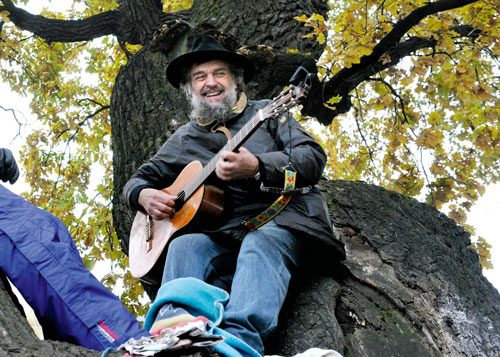
Samman, ska vi se-egra,
Samman, ska vi se-egra,
Samman, ska vi segra,
en da-a-a-a-ag.
Å-åh, djupt i mitt hjä-ärta-a,
kä-änner jag:
Samman, ska vi segra,
en dag!
Vi skall övervinna! - En dag...
Vapnen ska bli plogar! - En dag...
Livet måste värnas! - Idag...
Vi är inte rädda! - Idag...
Vi går hand i hand. - Idag...
Freden ska bli vå-å-år
Freden ska bli vå-å-år
Freden ska bli vår
en da-a-a-a-ag.
Å-åh, djupt i mitt hjä-ärta-a,
kä-änner jag:
Samman, ska vi segra,
en dag!”
inviata da Riccardo Venturi - 4/1/2006 - 09:52
Roland von Malmborg
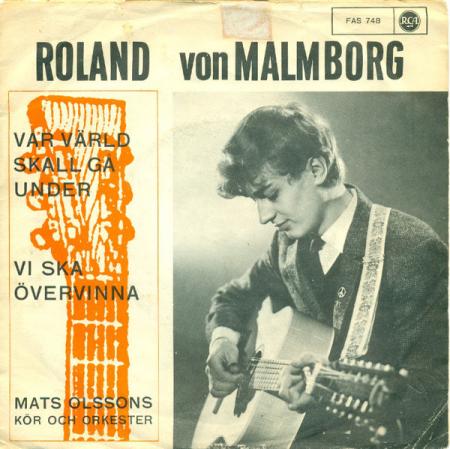
Svensk text: Roland von Malmborg, 1965
Amerikansk originaltext ”We Shall Overcome”: Traditionell amerikansk andlig sång (”I´ll Overcome Someday”) i bearbetning och med tillägg av medlemmar av Negro Food and Tobacco Union sam av Zilphia Horton, Frank Hamilton, Guy Carawan, Alex Comfort och Pete Seeger
Musik: Traditionell amerikansk andlig sång (”I´ll Overcome Someday”)
Vi ska övervinna,
Vi ska övervinna,
Vi ska övervinna
en dag.
Å, djupt i mitt hjärta
känner jag:
Vi ska övervinna en dag.
Vi vandrar hand i hand,
Vi vandrar hand i hand,
Vi vandrar hand i hand
en dag.
Å, djupt i mitt hjärta
känner jag:
Vi ska övervinna en dag.
Hela jorden kring,
Hela jorden kring
Hela jorden kring
en dag.
Å, djupt i mitt hjärta
känner jag:
Vi ska övervinna en dag.
Ljuset strålar fram,
Ljuset strålar fram,
Ljuset strålar fram
en dag.
Å, djupt i mitt hjärta
känner jag:
Vi ska övervinna en dag.
Alla ska bli fria,
Alla ska bli fria,
Alla ska bli fria
en dag.
Å, djupt i mitt hjärta
känner jag:
Vi ska övervinna en dag.
Fred i hela världen,
Fred i hela världen,
Fred i hela världen
en dag.
Å, djupt i mitt hjärta
känner jag:
Vi ska övervinna en dag.
Vi bygger en ny värld (i dag!),
Vi bygger en ny värld (i dag!),
Vi bygger en ny värld
i dag!
Å, djupt i mitt hjärta
känner jag:
Vi ska övervinna en dag.
Vi är inte rädda (i dag!),
Vi är inte rädda (i dag!),
Vi är inte rädda
i dag!
Å, djupt i mitt hjärta
känner jag:
Vi ska övervinna en dag.
Vi ska övervinna,
Vi ska övervinna,
Vi ska övervinna
en dag.
Å, djupt i mitt hjärta
känner jag:
Vi ska övervinna en dag.
inviata da Riccardo Venturi - 21/1/2021 - 08:47
Rauha sodan voittaa
rauha sodan voittaa
rauha sodan voittaa
tiedän mä sen
sillä sydämessäin
tiedän mä sen
rauha sodan voittaa
Kätes anna mulle
kätes anna mulle
kätes anna mulle
niin huomaat sen
sillä sydämessäin
tiedän mä sen
rauha sodan voittaa
Totuus valheen voittaa
totuus valheen voittaa
totuus valheen voittaa
tiedän mä sen
sillä sydämessäin
tiedän mä sen
rauha sodan voittaa
Veljet kaikki mukaan
veljet kaikki mukaan
veljet kaikki mukaan
kun tiedämme sen
sillä sydämessäin
tiedän mä sen
rauha sodan voittaa
Rauha sodan voittaa
rauha sodan voittaa
rauha sodan voittaa
tiedän mä sen
sillä sydämessäin
tiedän mä sen
rauha sodan voittaa
inviata da Juha Rämö - 16/3/2015 - 21:03
György István Gaál (L. Trans.)
Megérjük hidd el
Mind megérjük még
Hidd el megérjük, egyszer
Tiszta szívemből [1]
Mélyen hiszem
Eljön a nap hidd el
Együtt kéz a kézben
Együtt kéz a kézben
Együtt kéz a kézben, leszünk
Tiszta szívemből
Mélyen hiszem
Felvirrad a nap hidd el
Békében élünk majd
Békében élünk majd
Békében élünk majd egyszer
Tiszta szívemből
Mélyen hiszem
Felragyog a nap hidd el
Így lesz széles Földön
Így lesz széles Földön
Így lesz széles Földön, egyszer
Tiszta szívemből
Mélyen hiszem
eljön az a nap egyszer
Nem félünk már
Nem félünk már
Nem félünk már semmitől
Tiszta szívemből
Mélyen hiszem
Feljön az a nap még
Megérjük hidd el
Mind megérjük még
Hidd el megérjük, egyszer
Tiszta szívemből
Mélyen hiszem
Megérjük a napot, hidd el
inviata da dq82 - 27/11/2016 - 18:32
S. Bolotin - T. Sikorska /С.Болотин - Т.Сикорскa
У этой песни удивительная история.
Музыковеды говорят, что мелодия ее перекликается со старинной молитвой венецианских моряков, которая позже переросла в рождественский гимн, потом в негритянский спиричуэл, ставший популярным в негритянских баптистских церквях на юге США.
А ее первое "политическая" история такова:
В 1945 году началась забастовка рабочих компании American Tobacco.
К пикету бастующих рабочих из церкви вышла одна из участниц церковного хора негритянка Люсиль Симмонс и чтобы приободрить пикетчиков стала им петь: "В сердце своем я верю, что смогу когда-нибудь победить..".
Бастующие подпевали.
Они не сочиняли песню, они пели ее как песню борьбы, немного меняли мелодию, слова - вместо "Я смогу победить" стали петь "Мы сможем победить", потом добавляли слова: "Мы организуемся...", "Мы защитим наши права...", "Мы выиграем эту борьбу...".
Забастовка закончилась в 46-м, а песню продолжали петь - уже в других пикетах, в других штатах.
А потом песня окончательно "сформировалась", текст и мелодию зафиксировали, издали, записали в студии. В конце концов у нее стало сразу 4 автора - Сильвия Хортон, Гай Караван, Ли Хейс и Пит Сигер.
Песня "Все преодолеем" стала полуофициальным гимн борцов за гражданские права и в США, и во всем мире.
"Оvercome" можно перевести как "побороть, победить, преодолеть". Благодаря известности перевода, сделанного С.Болотиным и Т.Сикорской, у нас за песней закрепилось название "Все преодолеем". Хотя правильнее, вероятно - "Мы победим".
Песня была известна в 50-е годы, в 1960-м она появилась на первом диске Джоан Баэз, в 1963-м она прозвучала на всю страну в телетрансляции Марша на Вашингтон. Ее пели и в 60-е, и в 70-е годы и она продолжает жить и сейчас. Ее знают и в Индии, и в Израиле, и в Чехии, ее пели и американские конгрессмены, и участники Occupy Wall Street... Иногда меняется мелодический рисунок, добавляются, слова, но главная тема остается - МЫ ПРЕДОЛЕЕМ - agitclub.ru - Songs for Political Action
Все преодолеем,
Все преодолеем,
В мире нет преград для нас!
В сердце своем
Верим и ждем –
К цели мы придем в свой час!
Страх для нас неведом,
Страх для нас неведом,
Смерть грозила нам не раз.
В сердце своем
Верим и ждем –
К цели мы придем в свой час!
Правда – наша сила,
Правда – наша сила,
Это стяг в борьбе для нас!
В сердце своем
Верим и ждем –
К цели мы придем в свой час!
Мы сплотимся в дружбе,
Мы сплотимся в дружбе,
Люди всех цветов и рас!
В сердце своем
Верим и ждем –
К цели мы придем в свой час!
Мы хотим свободы,
Мы хотим свободы,
Пламень гнева не угас!
В сердце своем
Верим и ждем –
К цели мы придем в свой час!
Vsě prěodolěěm,
Vsě prěodolěěm,
V mirě nět prěgrad dlja nas!
V sěrdcě svoěm
Věrim i žděm -
K cěli my priděm v svoj čas!
Strax dlja nas něvědom,
Strax dlja nas něvědom,
Směrť groziła nam ně raz.
V sěrdcě svoěm
Věrim i žděm -
K cěli my priděm v svoj čas!
Pravda – naša siła,
Pravda – naša siła,
Äto stjag v boŕbě dlja nas!
V sěrdcě svoěm
Věrim i žděm -
K cěli my priděm v svoj čas!
My spłotimsja v družbě,
My spłotimsja v družbě,
Ljudi vsěx cvetov i ras!
V sěrdcě svoěm
Věrim i žděm -
K cěli my priděm v svoj čas!
My xotim svobody,
My xotim svobody,
Plaměń gněva ně ugas!
V sěrdcě svoěm
Věrim i žděm -
K cěli my priděm v svoj čas!
inviata da Riccardo Venturi - 22/1/2021 - 14:32
Sylwek Szweda [2005]
słowa i muzyka: Charles Albert Tindley
tłumaczenie: Sylwek Szweda 02.04.2005 ok. godz.12.00
(dedykuję Janowi Pawłowi II)
Korzenie gospel sięgają tzw. Sprirituals, pieśni „ludowych” tworzonych już od końca XVIII wieku przez czarnych niewolników w Ameryce. Stanowiły one mieszankę muzyki, którą przywieźli ze sobą z Afryki, oraz muzyki chrześcijańskiej - z którą zetknęli się na amerykańskich plantacjach. Początkowo odnosili się do chrześcijaństwa nieufnie - z ich punktu widzenia była to religia hipokryzji, wyznawali ją przecież zachowujący się bynajmniej nie po chrześcijańsku plantatorzy, ich właściciele. Jednocześnie fascynowały ich jednak historie biblijne, w których odnajdowali podobieństwo do własnych losów. W spirituals zawierali więc tęsknotę za wolnością, sprawiedliwością, godnością osobistą (wyraźnie słychać to w do dziś wykonywanych pieśniach „Oh freedom” i „Deep river”).Spirituals powróciły do łask jeszcze w latach 50' i 60', gdy wraz z niektórymi pieśniami gospel ponownie posłużyły do walki o prawa obywatelskie Afroamerykanów. Wróciły takie piosenki, jak „Oh freedom” czy „Eyes on the Prize”, narodziły się jednak także nowe, takie jak powstała w wyniku połączenia pieśni gospel „I'll Overcome Someday” ze spiritual „I'll be Alright” sztandarowa pieśń ruchu praw obywatelskich „We Shall Overcome”. - Sylwek Szweda.
Nota: La versione polacca di Sylwek Szweda è stata redatta esattamente il 2 aprile 2005 ed è dedicata quindi a papa Giovanni Paolo II, che esattamente quel giorno è morto.
Note: Sylwek Szweda's Polish version was made precisely on April 2, 2005 and is therefore dedicate to pope John Paul II, who died exactly on that day.
Zwyciężymy razem,
zwyciężymy razem,
Zwyciężymy pewnego dnia.
Głęboko w sercu mym
Ja wierzę w to,
Że zwyciężymy wszelkie zło.
Chwyćmy się za ręce,
chwyćmy się za ręce,
Chwyćmy się każdego dnia.
Głęboko w sercu mym
Ja wierzę w to,
Że zwyciężymy wszelkie zło.
Nie lękajmy się,
nie lękajmy się,
nie lękajmy się już dziś.
Głęboko w sercu mym
Ja wierzę w to,
Że zwyciężymy wszelkie zło.
My będziemy wolni,
my będziemy wolni,
uwolnimy się tego dnia.
Głęboko w sercu mym
Ja wierzę w to,
Że zwyciężymy wszelkie zło.
Nie jesteśmy sami,
nie jesteśmy sami,
nie jesteśmy sami dziś.
Głęboko w sercu mym
Ja wierzę w to,
Że zwyciężymy wszelkie zło.
Cały świat jest z nami,
cały świat jest z nami,
cały świat jest wokół nas.
Głęboko w sercu mym
Ja wierzę w to,
Że zwyciężymy wszelkie zło.
Prawda nas uwolni,
prawda nas uwolni,
prawda uwolni nas tego dnia.
Głęboko w sercu mym
Ja wierzę w to,
Że zwyciężymy wszelkie zło.
Czarny z białym razem,
czarny z białym razem,
czarny z białym każdego dnia.
Głęboko w sercu mym
Ja wierzę w to,
Że zwyciężymy wszelkie zło.
inviata da Pan Ryszard Węturowicz - 22/1/2021 - 15:22
Di cantanti e gruppi cechi che hanno successivamente interpretato il brano ce ne sono stati molti, anche perché era una delle canzoni che hanno accompagnato la Rivoluzione di velluto dell'89. I principali interpreti erano gli Spirituál kvintet
jednou budem dál, já vím,
jen víru mít, doufat a jít,
jednou budem dál, já vím.
Cíl je blízko nás, cíl je blízko nás,
cíl je blízko nás, já vím,
jen víru mít, doufat a jít,
cíl je blízko nás, já vím.
Jednou přijde mír, jednou přijde mír,
jednou přijde mír, já vím,
jen víru mít, doufat a jít,
jednou přijde mír, já vím.
inviata da Stanislava - 28/11/2016 - 13:25
We shall overcome
We shall overcome
We shall overcome
Some day
Deep in my heart
I do believe
We shall overcome
Some day
Jednou budem dál
Jednou budem dál
Jednou budem dál,
Já vím
Jen víru mít
Doufat a jít
Jednou budem dál,
já vím
Jednou budem dál,
já vím...
inviata da Dq82 - 26/11/2016 - 12:11
Wijdans (L. Trans.)
حتعدي
حتعدي
حيجي يوم وحتعدي
آه جوا قلبي
عندي إيمان
إنه حيجي يوم وحتعدي
حنمشي و إدينا ف إيدين بعض
حنمشي و إدينا ف إيدين بعض
حيجي يوم
حنمشي و إدينا ف إيدين بعض
آه جوا قلبي
عندي إيمان
إنه حيجي يوم وحتعدي
حنعيش بسلام
حنعيش بسلام
حيجي يوم ونعيش بسلام
آه جوا قلبي
عندي إيمان
إنه حيجي يوم وحتعدي
إحنا مش خايفين
إحنا مش خايفين
إحنا النهارده مش خايفين
آه جوا قلبي
عندي إيمان
إنه حيجي يوم وحتعدي
العالم كلو حوالينا
العالم كلو حوالينا
حيجي يوم العالم كلو حوالينا
آه جوا قلبي
عندي إيمان
إنه حيجي يوم وحتعدي
inviata da dq82 - 27/11/2016 - 18:29
Tavaana.org
باید غلبه کنیم،
باید غلبه کنیم،
باید غلبه کنیم،
یک روز.
در ژرفای قلبم
باور دارم که
یک روز
باید غلبه کنیم.
در ژرفای قلبم
باور دارم که
یک روز
باید غلبه کنیم.
باید غلبه کنیم
نمیترسیم،
نمیترسیم،
نمیترسیم،
نه، نه، نه،
چون در ژرفای قلبم
باور دارم که
یک روز
باید غلبه کنیم.
inviata da dq82 - 27/11/2016 - 18:38
马列托主义者 (L. Trans.)
我们将胜利
我们将胜利
终有一天我们将胜利
哦,在我的内心深处
我坚信
终有一天我们将胜利
我们将携手同行
我们将携手同行
有一天我们将携手同行
哦,在我的内心深处
我坚信
终有一天我们将胜利
我们都将自由
我们都将自由
终有一天我们都将自由
哦,在我的内心深处
我坚信
终有一天我们将胜利
我们不害怕
我们不害怕
终有一天我们将一直不害怕
哦,在我的内心深处
我坚信
终有一天我们将胜利
我们并不孤单
我们并不孤单
终有一天我们将不孤单
哦,在我的内心深处
我坚信
终有一天我们将胜利
整个世界都环绕着我们
整个世界都环绕着我们
终有一天整个世界都将环绕着我们
哦,在我的内心深处
我坚信
终有一天我们将胜利
wǒmen jiāng shènglì
wǒmen jiāng shènglì
zhōng yǒu yītiān wǒmen jiāng shènglì ó,
zài wǒ de nèixīn shēn chù
wǒ jiānxìn zhōng yǒu yītiān
wǒmen jiāng shènglì
wǒmen jiāng xiéshǒu tóngxíng
wǒmen jiāng xiéshǒu tóngxíng
yǒu yītiān wǒmen jiāng xiéshǒu tóngxíng ó,
zài wǒ de nèixīn shēn chù
wǒ jiānxìn zhōng yǒu yītiān
wǒmen jiāng shènglì
wǒmen dōu jiāng zìyóu
wǒmen dōu jiāng zìyóu
zhōng yǒu yītiān wǒmen dōu jiāng zìyóu ó,
zài wǒ de nèixīn shēn chù
wǒ jiānxìn zhōng yǒu yītiān
wǒmen jiāng shènglì
wǒmen bù hàipà
wǒmen bù hàipà
zhōng yǒu yītiān wǒmen jiāng yīzhí bù hàipà ó,
zài wǒ de nèixīn shēn chù
wǒ jiānxìn zhōng yǒu yītiān
wǒmen jiāng shènglì
wǒmen bìng bù gūdān
wǒmen bìng bù gūdān
zhōng yǒu yītiān wǒmen jiāng bù gūdān ó,
zài wǒ de nèixīn shēn chù
wǒ jiānxìn zhōng yǒu yītiān
wǒmen jiāng shènglì
zhěnggè shìjiè dōu huánràozhe wǒmen
zhěnggè shìjiè dōu huánràozhe wǒmen
zhōng yǒu yītiān zhěnggè shìjiè dōu jiāng huánràozhe wǒmen ó,
zài wǒ de nèixīn shēn chù
wǒ jiānxìn zhōng yǒu yītiān
wǒmen jiāng shènglì
inviata da Riccardo Venturi - 22/1/2021 - 06:15
M Naomi (L. Trans.)
我らは勝つ [1]
我らは勝つ
我らは勝つ いつの日か
心の奥で
私は信じる
我らは勝つ いつの日か
手に手を取って歩こう
手に手を取って歩こう
手に手を取って歩こう いつか
心の奥で
私は信じる
我らは勝つ いつの日か
我らは平和に生きる
我らは平和に生きる
我らは平和に生きる いつか
心の奥で
私は信じる
我らは勝つ いつの日か
我らは怖れない
我らは怖れない
我らは怖れない 今
心の奥で
私は信じる
我らは勝つ いつの日か
この世界中で
この世界中で
この世界中で いつか
心の奥で
私は信じる
我らは勝つ いつの日か
warera wa katsu
warera wa katsu itsunohika
kokoro no oku de
watashi wa shinjiru
warera wa katsu itsunohika
Te ni te o totte arukou
te ni te o totte arukou
te ni te o totte arukou itsuka
kokoro no oku de
watashi wa shinjiru
warera wa katsu itsunohika
Warera wa heiwa ni ikiru
warera wa heiwa ni ikiru
warera wa heiwa ni ikiru itsuka
kokoro no oku de
watashi wa shinjiru
warera wa katsu itsunohika
Warera wa osorenai
warera wa osorenai
warera wa osorenai ima
kokoro no oku de
watashi wa shinjiru
warera wa katsu itsunohika
Kono sekaijū de
kono sekaijū de
kono sekaijū de itsuka
kokoro no oku de
watashi wa shinjiru
warera wa katsu itsunohika
inviata da Riccardo Venturi - 22/1/2021 - 14:12
होंगे कामयाब होंगे कामयाब
हम होंगे कामयाब एक दिन
हो हो हो मन मे है विश्वास
पुरा है विश्वास हम होंगे कामयाब एक दिन
होगी शान्ती चारो ओर
होगी शान्ती चारो ओर
होगी शान्ती चारो ओर एक दिन
हो हो हो मन में है विश्वास
पूरा है विश्वास होगी शांती चारो ओर एक दिन
हम चलेंगे साथ साथ
डाले हाथोमें हाथ
हम चलेंगे साथ साथ एक दिन
हो हो हो मन में है विश्वास
पूरा है विश्वास हम चलेंगे साथ साथ एक दिन
नही डर किसी का आज
नहि भय किसी का आज
नहि डर किसी का आज के दिन
हो हो हो मन में है विश्वास
पूरा है विश्वास नही डर किसी का आज एक दिन
hoṁge kāmayāba hoṁge kāmayāba
hama hoṁge kāmayāba eka dina
ho ho ho mana me hai viśvāsa
purā hai viśvāsa hama hoṁge kāmayāba eka dina
hogī śāntī cāro ora
hogī śāntī cāro ora
hogī śāntī cāro ora eka dina
ho ho ho mana meṁ hai viśvāsa
pūrā hai viśvāsa hogī śāṁtī cāro ora eka dina
hama caleṁge sātha sātha
ḍāle hāthomeṁ hātha
hama caleṁge sātha sātha eka dina
ho ho ho mana meṁ hai viśvāsa
pūrā hai viśvāsa hama caleṁge sātha sātha eka dina
nahī ḍara kisī kā āja
nahi bhaya kisī kā āja
nahi ḍara kisī kā āja ke dina
ho ho ho mana meṁ hai viśvāsa
pūrā hai viśvāsa nahī ḍara kisī kā āja eka dina
inviata da Alessandro - 10/2/2010 - 15:25
Reinterpretata anche da Bhupen Hazarika
Also performed by Bhupen Hazarika
আমরা করবো জয়!
আমরা করবো জয়!
আমরা করবো জয়!
একদিন…
আহা বুকের গভিরে আছে প্রত্যয়
আমরা করবো জয়!
একদিন… ।।
একদিন সূর্যের ভোর
একদিন স্বপ্নের ভোর
একদিন সত্যের ভোর
আসবেই…
এই মনে আছে বিশ্বাস
আমরা করি বিশ্বাস
সত্যের ভোর আসবে
একদিন… ।।
পৃথিবীর মাটি হবে মধুময়
বাতাস হবে মধুময়
আকাশ হবে মধুময়
একদিন…
এই মনে আছে বিশ্বাস
আমরা করি বিশ্বাস
আকাশ হবে মধুময়
একদিন… ।।
আর নয় ধ্বংশের গান
জনতার ঐকতান
সৃষ্টির সুরে হবে গান
একদিন…
এই মনে আছে বিশ্বাস
আমরা করি বিশ্বাস
সৃষ্টির সুরে হবে গান
একদিন… ।।
আমরা মানি নাকো বাঁধা বন্ধন
হাতে বাধি রাঁখি বন্ধন
সামনে সত্যের জয়
একদিন…
এই মনে আছে বিশ্বাস
আমরা করি বিশ্বাস
সামনে সত্যের জয়
একদিন… ।।
আমরা করবো জয়!
আমরা করবো জয়!
আমরা করবো জয়!
একদিন…
আহা বুকের গভিরে আছে প্রত্যয়
আমরা করবো জয়!
একদিন… ।।
আমরা করবো জয়!
একদিন… ।।
āmarā karabō jaẏa!
Āmarā karabō jaẏa!
Ēkadina… āhā bukēra
gabhirē āchē pratyaẏa
āmarā karabō jaẏa! Ēkadina…
Ēkadina sūryēra bhōra
ēkadina sbapnēra bhōra
ēkadina satyēra bhōra āsabē'i…
ē'i manē āchē biśbāsa
āmarā kari biśbāsa
satyēra bhōra āsabē ēkadina…
Pr̥thibīra māṭi habē madhumaẏa
bātāsa habē madhumaẏa
ākāśa habē madhumaẏa ēkadina…
ē'i manē āchē biśbāsa
āmarā kari biśbāsa
ākāśa habē madhumaẏa ēkadina…
Āra naẏa dhbanśēra gāna
janatāra aikatāna sr̥ṣṭira
surē habē gāna ēkadina…
ē'i manē āchē biśbāsa
āmarā kari biśbāsa sr̥ṣṭira
surē habē gāna ēkadina…
Āmarā māni nākō bām̐dhā
bandhana hātē bādhi rām̐khi
bandhana sāmanē satyēra jaẏa ēkadina…
ē'i manē āchē biśbāsa
āmarā kari biśbāsa
sāmanē satyēra jaẏa ēkadina…
Āmarā karabō jaẏa!
Āmarā karabō jaẏa!
Āmarā karabō jaẏa! Ēkadina…
āhā bukēra gabhirē āchē pratyaẏa
āmarā karabō jaẏa! Ēkadina…
Āmarā karabō jaẏa! Ēkadina… ..
inviata da Dq82 - 28/11/2016 - 09:29
Ruma Guha Thakurta / রুমা গুহঠাকুরতা
Sadly enough, lyrics in Gurmukhi script seem not to exist on the Web; only the following, pronunciation-based transcription is available. The version is from 1976.
Ekdin surjer bhor
Ekdin shopner bhor
Ekdin shotter bhor asbei
Ei monay achey bissas
Amra kori bissas
Shotter bhor asbei din.
Prithibir mati hobey modhumoy
Batash hobey modhumoy
Akash hobey modhumoy ekdin
Ei money achey bissas
Amra kori bissas
Akash hobey modhumoy ekdin
Ar noi dhonsher gaan
Jonotar Oikotan
Sristir shurey hobey gaan ekdin
Ei money achey bissas
Amra kori bissas
Sristir shurey hobey gaan ekdin
Amra maninako badhabondhon
Hate badhi rakhi bondhon
Thambei shob krondon ekdin
Ei money achey bissas
Amra kori bissas
Thambei shob krondon ekdin
inviata da Dq82 - 28/11/2016 - 09:36
ringrazio per le informazioni, facili e esaurienti!
ciao
Puzza87 - 12/6/2006 - 20:00
Primavera di Praga
Blowing in the wind
Canzone del Maggio
Valle Giulia
...
in collegamento con il 68 e anzi gli anni '60 in generale
Maria - 3/7/2006 - 22:03
Antonio Rodilosso - 22/12/2006 - 18:00
Bea - 3/5/2008 - 15:41
Video da Repubblica on line
La folksinger americana canta la celebre 'We shall overcome' con alcune strofe in lingua farsi
daniela -k.d.- - 26/6/2009 - 21:53
Anche We shall overcome è una canzone che arriva a noi attraverso una storia di trasformazioni. C’è una canzone religiosa, I’ll be all right, che esprime quella endurance, quella capacità afroamericana di durare e sopravvivere che non è solo sopportazione (come sembrano pensare artisti del Sud come William Faulkner), ma è anche speranza e coscienza dell’ingiustizia – una coscienza e una speranza che si esprimono in un linguaggio religioso ma che non rinviano solo all’aldilà.
Infatti questa canzone religiosa diventa una canzone di lotta quando i braccianti delle piantagioni di tabacco del North Carolina l’adottano durante uno sciopero degli anni Quaranta, cambiandola in «I’ll overcome someday». È durante questo sciopero che la sente e la registra Zilphia Horton, organizzatrice politica e culturale del centro di Highlander del Tennessee (una scuola di base per sindacalisti e attivisti dei diritti politici nel mezzo del Sud più razzista e classista).
Molti anni dopo, quando a Highlander si tengono i workshop del nascente movimento dei diritti civili (ci viene Martin Luther King, ci viene anche Rosa Parks, che poi rifiutando di sedersi nel fondo dell’autobus darà inizio al boicottaggio di Birmingham), un giovane musicista bianco californiano, Guy Carawan – che conduce il settore culturale di Highlander – la ritira fuori dall’archivio e la insegna ai partecipanti. Con un cambiamento: la prima persona singolare diventa una prima persona plurale, la speranza e la resistenza non sono più quelle di ciascun individuo ma sono diventate finalmente quelle di un movimento. Qualche tempo dopo, l’ascolta Pete Seeger, che la porta al Nord, e da quel momento (specie da un memorabile concerto di Pete Seeger alla Carnegie Hall nel 1963) la canzone spicca il volo.
Mi ricordo un momento emozionante, alla fine degli anni Ottanta. Avevo organizzato una visita di Guy e Candie Carawan a Piadena, dove la Lega di cultura da più trent’anni tiene in piedi un lavoro culturale che è la più radicale e irriducibile resistenza e alternativa politica. La Lega di cultura organizzò un concerto dei due musicisti americani, nella cantina del municipio, un posto con un’acustica fantastica. Il pubblico era quasi tutto proletario, quasi nessuno sapeva l’inglese. Ma quando Guy e Candie attaccarono We shall overcome, istintivamente tutti si alzarono in piedi. Non credo che l’avrebbero fatto per l’inno di Mameli. In un’altra lingua, dall’altro lato del mondo, quella canzone era loro, parlava di loro e per loro. Non credo che possiamo permettere che venga scambiata per un incoraggiamento a superare il trauma dell’11 settembre prevalendo a forza di bombe...."
(Alessandro Portelli, “I giorni cantati”)
Dead End - 27/7/2012 - 09:53
Dq82 - 25/11/2016 - 19:19
a proposito della versione ceca di questa canzone, propongo di inserire l'intero testo ceco di tre strofe e citare anche il nome dell'autore: Ivo Fischer.
Jednou budem dál, jednou budem dál,
jednou budem dál, já vím,
jen víru mít, doufat a jít,
jednou budem dál, já vím.
Cíl je blízko nás, cíl je blízko nás,
cíl je blízko nás, já vím,
jen víru mít, doufat a jít,
cíl je blízko nás, já vím.
Jednou přijde mír, jednou přijde mír,
jednou přijde mír, já vím,
jen víru mít, doufat a jít,
jednou přijde mír, já vím.
Si trova ad esempio qui.
Di cantanti e gruppi cechi che hanno successivamente interpretato il brano ce ne sono stati molti, anche perché era una delle canzoni che hanno accompagnato la Rivoluzione di velluto dell'89. I principali interpreti erano gli Spirituál kvintet, ma basta mettere il titolo su youtube ed escono fuori tantissime versioni, tra cui anche quella bilingue che hai proposto tu (che mi pare molto bella).
Saluti!
Dq82
Stanislava - 28/11/2016 - 11:43





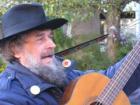


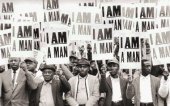

Zilphia Horton, Frank Hamilton, Guy Carawan, Pete Seeger
Una canzone talmente celebre da essere creduta generalmente di autore anonimo: come tale fu erroneamente inserita nelle "CCG primitive", e da qui nel sito in un primo momento. In effetti si tratta a tutti gli effetti, oramai, di una canzone popolare (la cui fama nacque con la sua adozione come "inno" del movimento per i diritti civili di Martin Luther King, nel 1963); ma l'autore è Pete Seeger, che si ispirò a uno spiritual negro del XIX secolo, "No More Auction Block for me" (ovvero qualcosa come: "Non mettetemi più all'asta", un titolo agghiacciante...) per la musica ed al gospel "I'll Overcome Some Day" di Charles Tindley (1900) per le parole. [Riccardo Venturi, 6.11.04]
La canzone deriva forse da una canzone gospel, probabilmente del 1903 del Rev. Charles Tindley di Philadelphia che conteneva il verso ripetuto più volte "I'll Overcome Some Day", ma più versosimilmente da una canzone gospel successiva che conteneva i versi "Deep in my heart, I do believe / I'll overcome some day.". A Charleston, South Carolina nel 1946, i dipendenti dell'American Tobacco Company in sciopero, per lo più donne afro-americane, stavano cantando degli inni durante un cordone per un picchetto. Una donna di nome Lucille Simmons cantò una versione della canzone cambiando il testo in "We'll Overcome". Zilphia Horton, una donna bianca e moglie del co-fondatore della Highlander Folk School (successivamente chiamato Highlander Research and Education Center) la imparò da lei. L'anno dopo la insegnò a Pete Seeger. [Dunaway, 1990, 222-223], [Seeger, 1993, 32]
Dal 1963, la canzone fu legata a Joan Baez che la registrò e la cantò in numerose marce per i diritti civili. I lavoratori agricoli negli Stati Uniti cantarono la canzone in spagnolo durante gli scioperi e i boicottaggi dell'uva alla fine degli anni '60. La canzone fu poi utilizzata anche in Sud Africa durante gli ultimi anni del movimento anti-apartheid. In India, la traduzione letterale in hindi "Hum Honge Kaamyab / Ek Din" divenne una canzone patriottica negli anni '80 e cantata ancora oggi.
Bruce Springsteen ha reinterpretato recentemente la canzone. La sua versione è stata inclusa nel trubuto Where Have All the Flowers Gone: A Tribute to Pete Seeger, e nel suo album del 2006 We Shall Overcome: The Seeger Sessions.
(da wikipedia)
The song derives from a gospel song, possibly a 1903 song by Rev. Charles Tindley of Philadelphia containing the repeated line "I'll overcome some day", but more likely a later gospel song containing the line "Deep in my heart, I do believe / I'll overcome some day." In Charleston, South Carolina in 1946, striking employees of the American Tobacco Company, mostly African American women, were singing hymns on the picket line. A woman named Lucille Simmons sang a slow "long meter style" version of the song, as "We'll Overcome". Zilphia Horton, a white woman and the wife of the co-founder of the Highlander Folk School (later Highlander Research and Education Center) learned it from her. The next year she taught it to Pete Seeger. [Dunaway, 1990, 222-223], [Seeger, 1993, 32]
Seeger (or someone else, he himself isn't sure and writes that it may have been Highlander's Septima Clark) changed "We will overcome" to "We shall overcome"; Seeger added some verses ("We'll walk hand in hand", "The whole wide world around") and taught it to Californian singer Frank Hamilton, who taught it to Guy Carawan, who re-introduced it to Highlander in 1959. From there, it spread orally and became an anthem of southern African American labor union and civil rights activism. [Dunaway, 1990, 222-223], [Seeger, 1993, 32]
From 1963 on, the song was associated with Joan Baez, who recorded it and performed it at a number of Civil Rights marches. On March 16, 1965, President Lyndon Johnson used the phrase "We shall overcome" in a speech before Congress [1]. Only a few days before, "Bloody Sunday" had occurred on the Selma to Montgomery marches. Farmworkers in the United States sang the song in Spanish during the strikes and grape boycotts of the late 1960s. The song later found its way to South Africa in the later years of the anti-apartheid movement. [Dunaway, 1990, 243] In India, its literal translation in Hindi "Hum Honge Kaamyab / Ek Din" became a patriotic song during the Eighties whose popularity has endured till today.
Bruce Springsteen re-interpreted the song, which has been included on Where Have All the Flowers Gone: A Tribute to Pete Seeger, and his 2006 album We Shall Overcome: The Pete Seeger Sessions.
(from wikipedia)
Riferimenti / References
* Dunaway, David, How Can I Keep from Singing: Pete Seeger, (orig. pub. 1981, reissued 1990). Da Capo, New York, ISBN 0306803991.
* Seeger, Pete and Blood, Peter (Ed.), Where Have All the Flowers Gone?: A Singer's Stories, Songs, Seeds, Robberies (1993). Independent Publications Group, Sing Out Publications, ISBN 1881322017.
* ___, "The We Shall Overcome Fund". Highlander Reports, newsletter of the Highlander Research and Education Center, August-November 2004, p.3.
Articolo di NPR news dove si può ascoltare in streaming la versione di Pete Seeger dal vivo alla Carnegie Hall.
In Storia di una canzone (dal blog di Alessandro Portelli) si spiega come l'io dello spiritual originale sia diventato noi nella versione resa famosa da Pete Seeger ed infine, con Bruce Springsteen, noi due:
(Alessandro Portelli)
QUICK INDEX OF VERSIONS AVAILABLE [19 languages up to now]
INDEX RAPIDE DES VERSIONS DISPONIBLES [19 langues jusqu'à présent]
Inglese / English 1 (Movimento diritti civili / Civil Rights Movement) - Inglese / English 2 (1998) - Inglese / English 3 (Roger Waters - End The Blockade Of Gaza) - Italiano / Italian 1 (Gianni Barnini) - Italiano / Italian 2 (Andrea Buriani) - Italiano / Italian 3 (Phantom's) - Livornese-Pisano (Riccardo Venturi) - Arabo / Arabic - Bengalese / Bengali 1 (Hemanga Biswas) - Bengalese / Bengali 2 (Ruma Guha Thakurta) - Cinese / Chinese (马列托主义者) - Ceco / Czech 1 (Ivo Fischer) - Ceco / Czech 2 (Earth Duo) - Finlandese / Finnish (Tapio Lipponen - Francese / French (Anonimo Toscano del XXI Secolo) - Giapponese / Japanese(M Naomi) - Hindi (Geet Ganga) - Persiano / Persian (Tavaana.org) - Polacco / Polish (Sylwek Szweda) - Russo / Russian (S. Bolotin - T. Sikorska) - Spagnolo / Spanish 1 - Spagnolo / Spanish 2 (El Teatro Campesino) - Svedese / Swedish 1 (Roland von Malmborg - Svedese / Swedish 2 (Roland von Malmborg) - Tedesco / German (Heinz Erich Karallus) - Ungherese / Hungarian (György István Gaál)